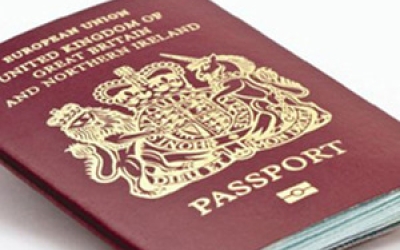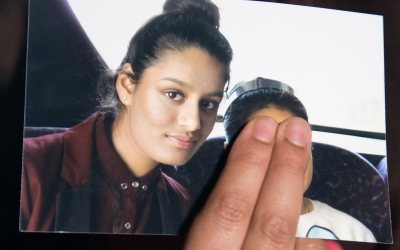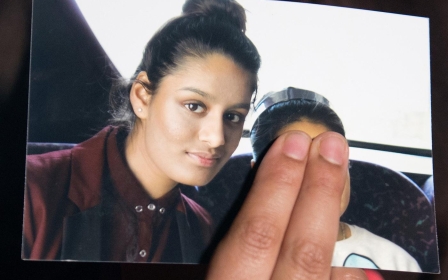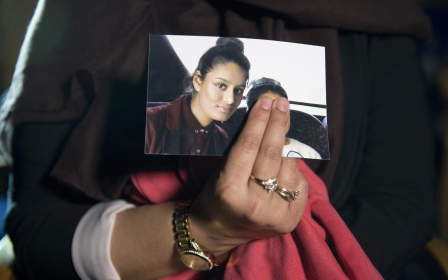High Court backs removal of UK man’s citizenship over joining Islamic State group
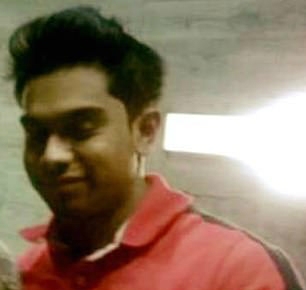
The father of a British-born student who travelled to Syria to join Islamic State (IS) has lost a legal fight to keep his son's UK citizenship after he was stripped of it by the former home secretary Amber Rudd in 2017.
Abdullah Islam had wanted his 22-year-old son, Ashraf Mahmud Islam, who joined IS aged 18 and is now being held in a Kurdish-run military prison in Syria, brought back to the UK to face justice and to be protected from facing the death penalty.
New MEE newsletter: Jerusalem Dispatch
Sign up to get the latest insights and analysis on Israel-Palestine, alongside Turkey Unpacked and other MEE newsletters
However, in the first case of its kind in the High Court, his case was rejected on Wednesday in a judgement which could set a precedent for other alleged British IS fighters and their wives who face or have had their citizenship revoked.
Rejecting the case as having "no merit" the judge, Mr Justice Pepperall, said Ashraf’s detention and risk of the death penalty was "entirely because of his own actions in travelling to Syria and engaging in jihad".
"The only action taken by the home secretary in this case has been to deprive Ashraf of his citizenship," he said.
"He is not in peril in Syria because of that decision, but because he is being held on suspicion of involvement in the IS insurgency."
'Not an issue for this court'
Ashraf travelled to Syria in April 2015 while he was studying law at a British educational establishment in Dhaka, Bangladesh.
As a result, he was stripped of his citizenship by Rudd in 2017, who said she did not believe that depriving him of his nationality would make him stateless as she believed he also had Bangladeshi citizenship.
The UK and citizenship-stripping powers
+ Show - HideThe UK has been described by researchers as a “global leader in using citizenship deprivation as a counterterrorism measure”.
Historic citizenship-stripping powers targeted at naturalised citizens on disloyalty grounds had largely fallen into disuse prior to 2002, when the government introduced new measures in an attempt to revoke the citizenship of Abu Hamza, an Egyptian-born cleric subsequently convicted of terrorism in the US.
The 2002 legislation allowed for British-born nationals as well as naturalised citizens to lose their nationality rights. Successive governments gradually broadened the scope of the powers so that home secretaries can now deprive anyone of citizenship if they are satisfied that doing so is “conducive to the public good” and would not leave an individual stateless.
No criminal conviction is required. Letters often state that individuals have been assessed as presenting “a risk to the national security of the United Kingdom”.
The government’s use of the powers surged to unprecedented levels in response to the perceived threat posed by British nationals returning from Syria.
Between 2010 and 2015, 33 people were stripped of their citizenship, according to Home Office figures. In 2016, 14 people were deprived, and in 2017 the number jumped to 104.
In 2018, the figure was 21, and in in 2019 - when Shamima Begum was among those targeted - it was 27. It then dropped to ten in 2020 and eight in 2021.
Some subjects of citizenship-stripping orders argue that they have been left effectively stateless, because the government bases its assessment that they are dual nationals on a right of citizenship to a parent’s country of birth, even if they have never taken up that citizenship or even visited the country.
In some cases the Special Immigration Appeals Commission, which rules on citizenship cases, has agreed: it has ruled in favour of British nationals of Bangladeshi descent on the grounds that Bangladesh does not consider them citizens if they have not claimed Bangladeshi nationality before the age of 21.
Human rights organisations and lawyers have compared the powers to “medieval exile and banishment”. Critics also point out that the powers create a two-tier system in which only those deemed to be dual nationals are at risk of losing their British citizenship; a measure that discriminates against naturalised citizens, immigrants and their children.
Citizenship can only be removed from dual nationals and where there is a “risk to national security” as to leave a person stateless is illegal under international law.
An appeal against deprivation of citizenship normally goes to the Special Immigration Appeals Commission, SIAC.
But SIAC turned down an appeal lodged by Islam, Ashraf's father, saying that appeals on somebody else's behalf were not allowed and that too long a period had passed.
Islam then took the case to the High Court, but refusing permission for a full judicial review hearing, the judge said on Wednesday there were no arguable grounds for challenging Rudd's decision.
Among several arguments put forward on his son's behalf, Islam, a barrister himself, stated that his son was not in fact a dual national and would be rendered stateless if deprived of British citizenship.
The judge found this a persuasive argument but “not, however, an issue for this court" stating it could only be taken up by Ashraf himself before the SIAC.
Address argument
In July 2017, Rudd wrote to Ashraf's last known address notifying him that he was to be deprived of his citizenship.
Islam received the deprivation of citizenship letter, but had no contact from his son until a letter begging for help arrived via the Red Cross in May 2018.
According to ITV News, which managed to interview Ashraf, he had been captured by Kurdish forces a few months previously and has been in prison since.
However, Mr Justice Pepperall rejected the argument that issuing the decision while Ashraf was abroad meant he was possibly still unaware of it, and therefore unable to appeal himself.
Islam had also argued that Ashraf was likely to be tried before an Iraqi, Syrian or Kurdish court, where he faces the death penalty and therefore argued the UK had a duty to bring him home to prevent a breach of Ashraf’s human rights.
Denying any such duty existed, the judge said: "However repugnant his possible fate might be to British values, any British citizen who commits serious crimes abroad is subject to local justice and cannot simply demand that the British government extricates him from a situation of his own making in order that he can face the more palatable prospect of justice in a British court."
Police seek unpublished material
In another recent high-profile case, Shamima Begum, who left the UK as a teenager to join IS in Syria in 2015, was deprived of her citizenship, preventing her from returning to the country. The government also argued that she had rights to dual British-Bangladeshi citizenship.
On Tuesday, UK police sought to gain access to unpublished material held by journalists who interviewed Begum in Syria.
London's Metropolitan police want the BBC, ITN, Sky News and the Times to hand over unpublished notes made during meetings with Begum under a provision of the Terrorism Act 2000, which could potentially aid a prosecution if Begum were granted the right to return to the UK.
Scotland Yard said officers would contact media organisations "if they believe that they may have information or evidence that could assist a criminal investigation".
Middle East Eye delivers independent and unrivalled coverage and analysis of the Middle East, North Africa and beyond. To learn more about republishing this content and the associated fees, please fill out this form. More about MEE can be found here.



